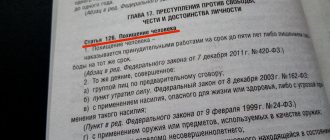Why do criminals kidnap a person? The motives can be different - selfish (when they demand a ransom), for the use of organs (in the field of transplantation), for coercion to various works, use in the drug or pornography business, because of hostile relationships or revenge (less common).
In any case, such a crime has a high degree of cruelty, in most cases the victim is killed. At the same time, there is another crime that is similar in its main features to kidnapping: unlawful deprivation of liberty. How to understand exactly what legal action has been committed? By what criteria can one conclude about the correct qualifications and how many years of imprisonment can those who break the law face? We will try to answer all these questions using basic legal concepts and judicial practice.
Kidnapping
Unfortunately, this type of criminal activity is not uncommon. Moreover, such crimes are carefully planned long before they are committed and are almost never committed alone. It often happens that a kidnapped person knows his abductors by sight, which leads to sad consequences: in order to cover up traces and eliminate eyewitnesses, the victim is deprived of his life.
The very concept of “kidnapping” is more fully disclosed in theory than in criminal law - this term is not in Article 126 of the Criminal Code of the Russian Federation. Kidnapping (it can be either secret or open) is characterized by active actions of the participants, since the nature of the crime implies the capture of a person and moving him to another place where he is planned to stay for a certain time.
The classic kidnapping is the following example: A.V. Davydov, who unsuccessfully demands the return of the borrowed 500,000 rubles from V.V. Rebrov, decides to kidnap his son, the minor A.V. Rebrov. To do this, he agrees with his acquaintance P.R. Utesov, who has a car, to kidnap a child from the school and take measures to obtain a ransom of double the amount - 1 million rubles, 20% of the amount A.V. Davydov. promises accomplice V.V. Rebrov. Since Rebrov’s son V.V. knows Davydov A.V. personally. as a family friend, he has no fears about the “unexpected” meeting of him near the school, he voluntarily gets into the approaching car, after which Davydov A.V. and Utesov P.R. They take the child to a pre-rented apartment on the outskirts of the city, where they live for three days. During this time, the kidnappers periodically call the minor's father and demand a million rubles under the threat of causing the kidnapped person's death.
In this situation, we see typical signs of kidnapping within the meaning of criminal law:
- A man is captured against his will by intruders.
- The victim is moved to another location and held there.
It should be noted that in most cases, the actions of criminals are also qualified under other articles of the Criminal Code of the Russian Federation, since kidnapping alone without further intentions is rarely committed. Thus, in the above example, the actions of the perpetrators fall under the signs not only of Art. 126 of the Criminal Code of the Russian Federation, but also extortion with threats of violence.
The article in question contains a fairly large number of additional features provided for by the legislator in part two:
- when a crime is committed by several persons (by prior agreement, with the distribution of roles and a clear definition of the degree of participation of each);
- with violence or threats of its use (this is the symptom that most often “accompanies” the kidnapping of a person, since it serves as a way to suppress the resistance of the victim);
- when they use weapons or any objects instead of them (bats, sticks, clubs, etc.);
- if the weakest representatives of humanity are kidnapped: children, pregnant women;
- when the kidnapping is carried out against several (more than two) persons;
- if the motive for committing a crime is selfish.
These additional signs give the right to increase the punishment from five years of imprisonment (“simple kidnapping”) to twelve .
In addition, if the actions are committed by a criminal group or the victim died (due to negligence), then the perpetrator may be sentenced to 15 years of isolation .
Unlawful imprisonment
Unlike kidnapping, during unlawful deprivation of liberty the person is restricted in movement and remains in the place where he was at the time the crime was committed. He is deprived not only of the opportunity to leave the apartment, house, premises, but also to call, let people into the home, etc.
When qualifying on the grounds of unlawful deprivation of liberty, the intent of the perpetrator must be aimed precisely at achieving this goal - to create certain restrictions. So, if a person is detained during the commission of a robbery (for example, while searching for money in an apartment, the owner is not allowed to leave), additional qualifications under Art. 127 of the Criminal Code of the Russian Federation is not required, all actions are covered by robbery - the intent is aimed at taking possession of property.
A classic example of unlawful deprivation of liberty is the following situation: Due to jealousy and reluctance to part with his common-law wife, Ivanova S.V. roommate Mamontov A.P. forcibly kept her in a rented apartment where they had previously lived together. In response to screams and demands to open the door, Mamontov A.P. did not react, limited access to the window to pieces of furniture, threatening to use violence if the victim tried to call for help. At the same time, A.P. Mamontov he independently prepared food for himself and for S.V. Ivanova, allowed him to visit the bathroom, draw, and clean the house. Thus, the accused and his former partner lived in the apartment for 10 days.
As can be seen from the example, the victim was at home and, due to the actions of her partner, was deprived of the opportunity to leave the apartment, communicate with people, take walks, etc. At the same time, she was forcibly kept in her home, but did not move anywhere.
Article 127 of the Criminal Code of the Russian Federation is significantly milder in terms of punishment, in contrast to the previous one, since the negative consequences manifest themselves to a lesser extent than in the case of kidnapping. Thus, for “simple” unlawful deprivation of liberty, the criminal law provides for up to two years of imprisonment, for qualified – up to eight years .
Release from liability
The articles of the Criminal Code under consideration contain notes that usually explain to law enforcement officers the occurrence of some exceptional situations and describe the actions that must be taken in this case. Art. 126 and 206 are no exception, and they include a solution to the issue regarding exemption from criminal liability.
Kidnapping, even with the full corpus delicti and the presence of all the necessary signs, allows for the release of persons from criminal liability, of course, under certain conditions. If the subject of the crime voluntarily releases the victim, that is, the kidnapped person, he can be released from punishment. It is important that his actions do not contain any other corpus delicti.
In the case of hostage taking, the conditions are similar, except for one important point. A person can release the victim either voluntarily or at the request of the authorities. Such actions, despite their relatively coercive nature, will also be considered acceptable in order to avoid criminal liability.
Some collisions
Deprivation of freedom against a person’s will is a narrower concept than kidnapping:
- kidnapping consists of taking, moving, holding;
- deprivation of liberty consists only of detainment and restriction of freedom of movement.
The famous case of Viktor Mokhov, who held two women in his basement for several years, is indicative in terms of the distinction between kidnapping and unlawful imprisonment. Mokhov was found guilty of kidnapping two girls, 14 and 17 years old, who were placed by him in a basement and suffered several years of humiliation and abuse. Here we see that there was a movement of the victims to a place convenient for the criminal, where he kept them for his pleasures. At the same time, involuntary residence in a basement is not qualified separately; it is already covered by Article 126 of the Criminal Code of the Russian Federation, which provides for liability for kidnapping.
In judicial practice, some qualification problems are resolved ambiguously:
How long should unlawful imprisonment be?
The legislator does not provide a time period during which deprivation of the right to movement will be considered illegal. It is enough to carry out the corresponding actions against the will of a person. At the same time, a short-term restriction will likely be recognized as a minor crime and not causing any harm to the victim.
When is deprivation of liberty considered illegal?
It is clear that, according to the investigator’s decision, keeping the suspect under house arrest in a pre-trial detention center will be considered legal and, of course, does not fall under Article 127 of the Criminal Code of the Russian Federation. At the same time, if a mother does not allow her adult son to go outside, forcing him to do certain housework, will there be illegal imprisonment here? It is difficult to answer such a question, but if you read the law literally, theoretically there are signs of a crime.
Can kidnapping be legal and excluding liability?
No matter how strange it may seem, it can be non-criminal. So, according to the customs of some Caucasian peoples, it is necessary to kidnap her, sometimes she is not returned for several hours. In such cases, there is a note to Article 126 of the Criminal Code of the Russian Federation about the absence of liability of the perpetrator if he voluntarily handed over the stolen property (there is no such note in Article 127 of the Criminal Code of the Russian Federation). The legislator has not specified how long this extradition must take place.
Sources
1. Man: crime and punishment. Publisher: Academy of Law and Management of the Federal Penitentiary Service (Ryazan). ISSN: 1999-9917. Distinguishing between kidnapping and unlawful deprivation of liberty and hostage taking. Melnikov M. G., Kraskovsky Ya. E.
2. QUALITY OF CRIMINAL LAW: PROBLEMS OF SPECIAL PART. Monograph. Executive editor, Honored Scientist of the Russian Federation, Doctor of Law, Professor A. I. Rarog, Prospekt LLC, 2017.
3. Boyko N. N. Illegal deprivation of liberty under Soviet criminal law: abstract. Diss. ... K. Yu. n. Kharkov, 1989.
4. Archives of the Yoshkar-Ola City Court. Case No. 22-282/09.
Hostage taking
Very close to the analyzed articles of the criminal law is the crime called hostage taking - we have all seen in films negative characters demanding to send a plane to another country or hand over a million dollars in cash. Let us note several features of the qualification of such actions:
- This crime (Article 206 of the Criminal Code of the Russian Federation) is contained in a special chapter of the code dedicated to the public safety of Russian citizens. Kidnapping or deprivation of liberty implies a violation of personal freedom;
- the act carries a high danger for complete strangers, an unlimited circle of people, whereas in Articles 126, 127 of the Criminal Code of the Russian Federation the danger, first of all, threatens only the victim;
- kidnapping or deprivation of liberty is almost always carried out with maximum secrecy for third parties, while hostage taking is always a public act, the criminal reports it personally, in the presence of a large crowd, with the participation of the media, wanting to convey his actions to a wide audience;
- possible demands in case of abduction are addressed mainly to the victim’s relatives, her relatives, etc., that is, certain persons who are not indifferent to the life or health of the victim. When committing a crime under Art. 206 of the Criminal Code of the Russian Federation, demands to provide any benefits in exchange for a hostage are usually addressed to the head of state, government, law enforcement agencies, whose employees have never known or seen the hostage before;
- victims of a crime under Art. 206 of the Criminal Code of the Russian Federation, there may be a random person who found himself in the wrong place at the wrong time. This person is a means to achieve the goal for the culprit; they can also provide cover for unhindered passage from a building surrounded by police, etc.;
- Since 2006, hostage-taking has been recognized in Russia as a crime of an international terrorist nature; in this regard, committing it is punishable by up to 20 years in prison . Along with this measure of punishment, the article contains a note about exemption from liability in cases where the hostage is released voluntarily - this way the legislator increases the chances of saving the life of the victim.
Object, subject and subjective side
What is being encroached upon, that is, any social relations, is the object of a crime. In the event of hostage taking, they will be represented by such an element as public safety. For example, the taking of hostages by terrorists implies the goal of intimidation and obtaining some benefit from the state. This is considered a distinctive feature of this type of crime.
The subject, that is, the one who committed a socially dangerous act, is always common. A physically sane person who has reached a certain age is the subject. The only thing that may differ is the last requirement, that is, age, which in some cases may even be lower than 16 years. Hostage-taking is an act for which a person who has reached fourteen years of age is held accountable.
The subjective side is always guilt, that is, the attitude of the criminal to what he does and the consequences of these actions. When taking hostages, it always manifests itself in the form of direct intent and does not imply negligence. This is the reason why this act is considered particularly dangerous.






